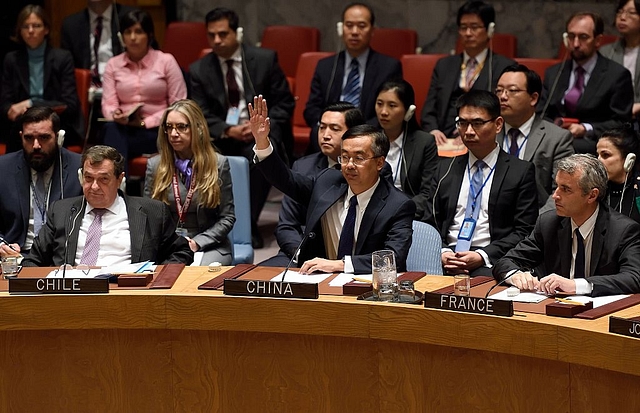
Will China Ditch North Korea And Support The UN Bid?
The United Nations Security Council (UNSC), on 1 March, decided to postpone its vote on sanctions against North Korea by a day.
The vote will decide on whether to bring the sanctions into effect, but whether the sanctions manage to hurt Kim Jong-un will depend on how far China plays along.
The United Nations Security Council (UNSC), yesterday (1 March), decided to postpone its vote on sanctions against North Korea to today (2 March), after the Russian delegation asked for time to examine the detailed draft resolution. If voted into effect, the resolution will mandate, among other things, inspection of cargo entering and leaving North Korea by sea or air.
The draft resolution is the product of a seven-week-long negotiation between the United States and China – North Korea’s lone traditional ally and benefactor. America has led this latest attempt to stifle North Korea after Pyongyang conducted a nuclear test and launched a satellite-bearing rocket earlier this year – both in defiance of previous UNSC resolutions.
Wednesday’s vote, if successful, will formally bring the sanctions into effect, but much of its effectiveness will depend on whether Beijing is willing to play along. Consider the geopolitical situation prevailing in the region. Following North Korea’s satellite launch early last month and the jitters that it caused in Seoul, America was in talks with South Korea to deploy the Terminal High Altitude Area Defence (THAAD) system which would target short, medium and intermediate ballistic missiles in flight.
Beijing later warned that any missile deployment on the Korean peninsula would destabilize the region’s security. “[The THAAD] would break the strategic balance in the region and create a vicious cycle of Cold War-style confrontations and an arms race, which could escalate tensions,” said the Chinese ambassador to South Korea, Qiu Guohong.
Some analysts believe that China is likely to lend its full support to sanctions on North Korea, given its commitment to the nuclear Non-Proliferation Treaty (NPT) which guards the exclusivity of the nuclear club – a significant factor in ensuring that nuclear powers are indeed ‘powers’. Beijing acted tough enough on Iran, for instance, to force Tehran to sign a deal which curbed its nuclear program significantly.
But North Korea isn’t Iran, and Pyongyang’s strategic role in the Asia Pacific can’t be ruled out. North Korea already has its own nuclear arsenal, unlike Iran which was still in the process of building one. North Korea’s location on the rim of the Pacific further makes it a significant player in the region’s security.
China has been mindful of the role that a nuclear-armed North Korea can play in the balance of power in the Pacific, and has looked to use Pyongyang in countering America’s ‘Asia Pivot’, which is Washington’s attempt to play a larger role in the Asia Pacific. America’s recent moves to shore up the defences of its allies, Japan and South Korea, only make it more plausible that Beijing is unlikely to desert its only friend in the region, particularly at a time when its own tensions with Japan have escalated.
Pyongyang has so far been able to flout the UN’s resolutions with impunity because of its proximity to Beijing. Whether the UNSC’s sanctions finally manage to hurt Kim Jong-un will therefore depend on how far China plays along.